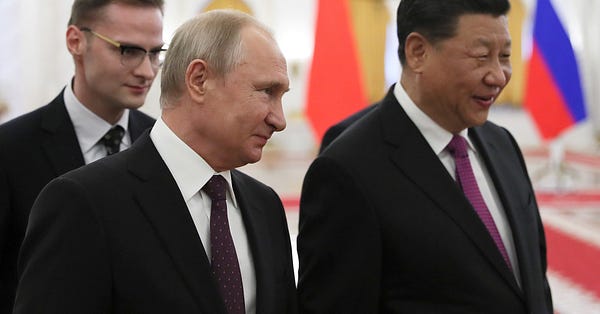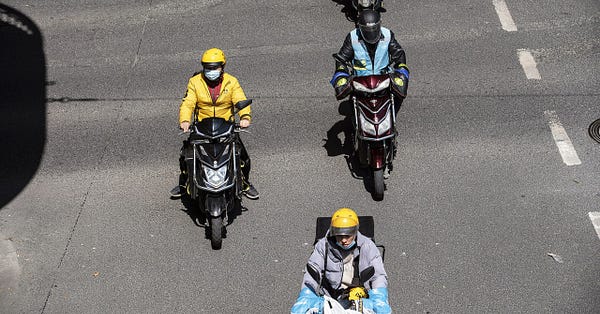Welcome to the 107th edition of Trade War.
During a two-hour virtual meeting between Biden and Xi, U.S. warns China not to help Russia, while Beijing criticizes Washington over Taiwan policy. And Chinese official says in speech that the U.S. Indo-Pacific strategy could push Asia Pacific over the “edge of an abyss.”
China turns to ‘closed-loop’ bubble for factories as Covid spreads. Chinese health official calls for elderly to get vaccinations. Beijing pledges market-friendly policies to boost economy. And Chinese stocks move from rout to recovery.
A note on publication schedule: Trade War will take a one-week hiatus for spring break with no edition published on March 26. We will resume weekly publication with our next issue coming out on April 2.
Biden - Xi meeting underscores deadlock
The two-hour video call between U.S. president Joe Biden and China’s President Xi Jinping exposed a “deepening divide” between the two countries, reports Politico’s Phelim Kine.
“Biden’s outreach failed to prod Xi to commit to leveraging Chinese influence to end Russia’s aggression in Ukraine or to even use the term “invasion,”” writes Kine.
“The call instead provoked Xi’s implicit criticism of the alleged U.S. role in fomenting the crisis, perceived U.S. meddling in Taiwan and bitterness toward threatened U.S. sanctions against China if it aids Russia’s war effort.”
“The personal relationship was never going to override national interests, which are in conflict, but what it did do was provide a basis for partial communication, but that’s basically been undone,” Chas Freeman, former deputy chief of mission at the U.S. Embassy in Beijing, told Politico.


Chinese readout tougher on US than English version
The Chinese and English versions of Beijing’s readout of the Biden-Xi meeting differ substantially, points out Hofstra University law professor Julian Ku.
The Chinese version “includes Xi blaming Biden's team for undermining the two leaders' consensus, and Xi blaming the US in general for causing problems in the relationship and the world,” notes Ku.
(Here is the very short White House readout.)


How far will Putin & Xi take ‘no limits’ partnership?
How far will Putin and Xi take their “no limits” partnership? Here are some thoughts from three Atlantic Council experts, including yours truly, this Trade War author.
Putin is a critical partner in China’s “deepening rivalry” with Washington, notes Global China Hub director David Shullman who previously worked as a senior intelligence official focused on East Asia. Beijing will “pair its rhetorical claims to neutrality with financial assistance for Putin’s regime at levels deemed unlikely to draw a serious response” from the United States and NATO.
China continues to operate under the assumption “that the United States is an adversarial declining hegemon, Russia is the strategic partner, and they don’t know how this ends and can’t yet adjust,” says John Culver, a nonresident senior fellow with the Global China Hub and a former CIA senior intelligence officer.
Meanwhile, “Beijing believes that Moscow is right to feel aggrieved” and see the NATO-Russia standoff as comparable to perceived US meddling in the Indo-Pacific and with Taiwan, says Scowcroft Center senior fellow Dexter Roberts. And China’s leaders “hope to have Russia’s support, including at the UN if necessary, when they eventually move more forcefully to rein in Taiwan.”
Finally, Beijing knows perfectly well that pressuring Putin won’t warm relations with Washington—whose perceived broader intent is “to stymie China’s rise,” adds Roberts. That means “China’s role in any concerted peace effort is likely to be half-hearted, of limited value in affecting Russia’s behavior, and possibly even counterproductive.”


Beijing’s balancing act
Listen to this podcast with Bloomberg Radio’s Carol Massar and Tim Stenovec for more of my thoughts on what motivates Beijing’s approach to the Russian invasion of Ukraine, as well as our conversation on recent moves to boost Chinese stocks and the U.S.-China trade relationship.

Washington’s “dangerous” Indo-Pacific Strategy
Washington's "Indo-Pacific Strategy is as dangerous as the NATO strategy of eastward expansion in Europe. If allowed to go on unchecked, it would bring unimaginable consequences, and ultimately push the Asia-Pacific over the edge of an abyss," said vice foreign minister Le Yucheng in a March 19 speech in Beijing.

Hong Kong struggles with lethal Covid wave
“I’m not sure people appreciate quite how bad the Covid situation is in Hong Kong, nor what might be around the corner,” writes the Financial Times’ John Burn-Murdoch, in an alarming tweet thread with graphs. (Here is the FT original story.)
“Comparing Hong Kong to its peers, all of whom kept Covid largely at bay for the best part of two years, it’s extraordinary the extent to which it is an outlier in terms of the lethality of this wave. So what’s driving this?”
“Vaccines. Or more specifically: the elderly vaccination rate. When Omicron hit, *more than two-thirds of people aged 80+ in Hong Kong were still unvaccinated*, compared to a couple of percent in New Zealand and Singapore. This was a year after vaccines became available,” tweets Burn-Murdoch.


Chinese official urges elderly vaccination
“Chinese COVID-19 vaccines are safe for the elderly, and it is imperative for this highly vulnerable demographic to be inoculated so as to avoid becoming critically ill, Zheng Zhongwei, head of China's COVID-19 vaccine development task force, said at a news briefing on Saturday,” reports the People’s Daily app.
While some seniors believe staying at home can protect them and so there is no need to be vaccinated, Zheng called this "extremely dangerous,” particularly given the frequency of asymptomatic cases of Omicron.
"When these asymptomatic family members come back home they introduce the risk of infection to the elderly," Zheng said.


Factory worker bubble to protect supply chain
In an effort to minimize supply chain disruptions, China is allowing some companies including iPhone maker Foxconn to restart production in locked-down Shenzhen, reports Bloomberg News.
In what is being called a closed-loop system, workers are driven directly between company dormitory and factory floor, while being regularly tested for Covid. Similar measures used two year ago “enabled China to emerge swiftly from the initial pandemic economic hit, despite fears restarting factories would contribute to the virus’s spread.”
“The system -- which effectively puts factory workers in a bubble, insulated from outside infection -- is also being used in nearby Dongguan, a manufacturing center that pumps out shoes, toys and textiles for export around the globe, but has restrictions in place to quell a virus outbreak, as well,” reports Bloomberg.
Still, the system, similar to what was used during the recently closed Beijing Olympics, is not easily replicable to the rest of the economy.
“Most people in China do not work in factories, but in offices, shops, restaurants and the like. In those type of workplaces it is much harder to set up a closed-loop bubble,” said Louis Kuijs, Asia Pacific chief economist at S&P Global Ratings.

Officials’ sweeping promises aim to roust China growth
“A sweeping set of promises this week from Xi’s government to make regulation more transparent and predictable -- as well as a commitment to overseas markets including Hong Kong -- suggests authorities are appealing to investors abroad,” writes Bloomberg’s Sofia Horta e Costa.
“The ruling Communist Party is seeking to regain the trust of international funds and the global business community after the country was lumped in with Russia as an “uninvestable” destination,” Bloomberg reports.
Efforts to soothe worried overseas and domestic investors included Xi pledging to limit the economic impact of China’s zero-Covid policy, officials signaling an end to the crackdown on tech companies while announcing plans for a property tax have been put on hold, as well as Beijing considering finally allowing U.S. regulators to audit Chinese firms listed on American exchanges.
“The market was in freefall -- a clear signal was needed from a senior level to clear the air,” said University of California San Diego professor Victor Shih. “I think unclear and even deleterious policy conditions were beginning to create an all-out panic.”
—If you are not already, I highly recommend you start following Bloomberg’s Sofia Horta e Costa on Twitter, most notably for her valuable weekly China economy and finance roundups.

Stocks go from rout to recovery
“The Nasdaq China index surged 33 percent with Alibaba [sealing its] biggest gain since 2014, closing 37 percent higher, after China’s securities regulator vowed to spare no effort to maintain the stable operation of the capital market and keep overseas listing channels open,” tweets Die Welt’s Holger Zschaepitz.


Notable/In Depth
“China in recent years absorbed the bulk of global capital flows to EM,” tweets Robin Brooks, chief economist at the Institute of International Finance.
“But since Russia's invasion of Ukraine, there's very large outflows from China, which have already pulled our total for Q1 2022 negative (red). Putin has made global markets look at China in a new light...”


“While the Ukraine invasion is still in its early days, it has already demonstrated how the United States and its allies can prevent a Chinese invasion [of Taiwan] from becoming the world’s next big crisis,” writes Rand Corporation’s Jeffrey W. Hornung, in War on the Rocks.
“Rather than treat a Chinese victory as inevitable, Washington should begin preparing in peacetime to ensure a rapid, coordinated military and economic response to any potential attack.”
Watching Putin’s difficulties in Ukraine, “a logical and dispassionate analysis would suggest that Chinese war planners are having second and third thoughts [about moving on Taiwan],” says former deputy National Security Advisor Matt Pottinger, in an interview in the Wall Street Journal.
“But logic and dispassionate analysis are not the hallmarks of Xi Jinping. Xi is viewing the world in the reflection of fun-house mirrors at this point.”
Pottinger says Taiwan must unwind its economic ties with China and that President Tsai Ing-wen “has made significant progress in really taking charge of the military services that she commands and getting them to focus on truly asymmetric capabilities, by which I mean ones that are not only quite lethal to China, but also quite affordable for Taiwan.”
The Taiwanese “need to show China that the war doesn’t end at the beaches. It will continue in the ports, in the cities, in the countryside and in the mountains,” says Pottinger.


“Chinese evaluations of the bilateral relationship and of the USA slumped during the Trump era but rebounded somewhat after Biden took office,” write Rice University’s Songying Fang, University of British Columbia’s Xiaojun Li, and Adam Y Liu, of the National University of Singapore, in The Chinese Journal of International Politics.
“In addition, the majority of Chinese respondents believed their country to be the world’s largest and leading economy and favored China being the world’s leading power, either by itself or alongside the USA. Furthermore, younger and more educated respondents held more negative views, although these were mitigated by personal connections with and experiences in the USA.”


China’s often dangerous gig economy now employs one quarter of the labor force, or some 200 million workers, writes Masha Borak in Wired.


Montana picture
We got what may be our last big snowstorm of the spring.
\






